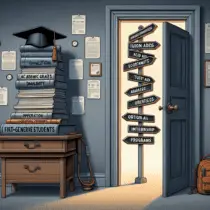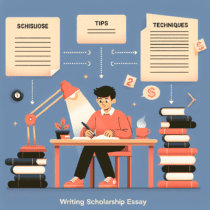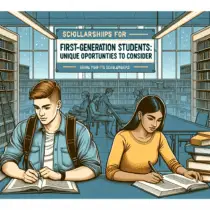Scholarships for First-Generation Students: Opportunities You Might Not Know About
Going to college can be a crucial step towards a bright future. But it can also be expensive, especially for first-generation students. First-generation students are those whose parents did not attend college. They often face unique challenges. Financial barriers can be a huge hurdle. Fortunately, many scholarships are designed to help these students achieve their dreams. Here are some opportunities you might not know about.
Federal Grants and Scholarships
The federal government offers several scholarships and grants for first-generation students. The most well-known is the Pell Grant. This grant is given based on financial need. To apply, students must fill out the Free Application for Federal Student Aid (FAFSA). Pell Grants do not need to be repaid, making them an excellent financial resource.
Another federal option is the Federal Supplemental Educational Opportunity Grant (FSEOG). This grant is aimed at students with exceptional financial needs. Schools award FSEOG funds to students who already receive Pell Grants. The amounts range from $100 to $4,000 a year.
State-Based Scholarships
Many states offer their own scholarship programs for first-generation students. These programs often have unique eligibility requirements. For example, California offers the Middle Class Scholarship. This scholarship is for undergraduates from middle-income families. It provides funding to attend University of California or California State University campuses.
Texas has the Texas Education Opportunity Grant (TEOG). This grant helps students attending public two-year colleges in Texas. Students must have significant financial need to qualify. They must also maintain satisfactory academic progress while in school.
College-Specific Scholarships
Many colleges and universities have their own scholarships for first-generation students. These can range from small grants to full-ride scholarships. For instance, the University of North Carolina offers the Carolina Firsts program. This program provides financial aid, mentoring, and community support to first-generation students.
Another example is the First-Generation Scholars Program at the University of California, Berkeley. This program gives first-generation students financial aid, academic support, and opportunities for personal development. These awards can significantly ease the financial burden of attending college.
Students should check with the financial aid office of their chosen school to learn about available scholarships. Many colleges also have online portals where students can search for scholarships.
Non-Profit and Community-Based Scholarships
Non-profit organizations and community groups often offer scholarships for first-generation students. These scholarships can be local or national in scope. For example, the Gates Millennium Scholars Program offers substantial scholarships to high-achieving, low-income students of color.
Another excellent program is the Dell Scholars Program. This program provides $20,000 scholarships, laptops, and textbook credits. The Dell Scholars Program focuses on students who have overcome personal challenges.
Local community foundations also offer valuable scholarships. These scholarships can be less competitive because fewer students apply for them. Students should check with their high school guidance counselor for community scholarship opportunities.
Corporate and Private Scholarships
Many companies offer scholarships specifically for first-generation students. These companies recognize the importance of education and want to invest in future leaders. For example, the Coca-Cola Scholars Foundation awards scholarships to outstanding high school seniors.
Another option is the Comcast Leaders and Achievers Scholarship. This program supports students who demonstrate leadership skills and a commitment to community service.
Private foundations also offer scholarships. For instance, the Jack Kent Cooke Foundation provides scholarships to high-achieving students with financial need. The foundation offers both undergraduate and graduate scholarships.
Scholarships for Specific Fields of Study
Certain fields of study offer scholarships for first-generation students. These scholarships often aim to increase diversity in specific industries. For example, the Accenture American Indian Scholarship Fund targets Native American students pursuing degrees in engineering, computer science, and business.
The Society of Women Engineers provides scholarships for first-generation female engineering students. The scholarship supports women who are passionate about engineering and technology fields.
In the medical field, the National Hispanic Health Foundation offers scholarships for first-generation Hispanic students studying healthcare disciplines. These scholarships encourage students to pursue careers that improve community health.
Tips for Applying
Applying for scholarships can seem daunting, but following some tips can make the process smoother. First, it’s crucial to start early. Many scholarships have deadlines months before the academic year begins. Starting early gives students plenty of time to gather necessary documents and write compelling essays.
Second, students should apply for as many scholarships as possible. The more applications they submit, the higher their chances of receiving funding. Many small scholarships can add up to significant financial support.
It’s also essential to tailor each application to the specific scholarship. Students should carefully read the requirements and ensure they address all criteria in their essays and applications.
Finally, students should seek help if needed. High school guidance counselors, teachers, and mentors can provide valuable advice and feedback on applications. Many communities also offer free workshops on scholarship applications.
Challenges Facing First-Generation Students
Understanding the challenges faced by first-generation students helps to contextualize the importance of scholarships. These students often lack the familial knowledge and experience of navigating higher education. They may not know about the resources available to them or how to access financial aid.
First-generation students also often work part-time jobs to support themselves and sometimes their families. This can make it difficult to balance work, school, and scholarship applications. Scholarships alleviating financial stress can allow these students to focus more on their studies and personal growth.
Additionally, first-generation students may face cultural barriers. They may feel out of place in academic settings or encounter prejudice and biases. Scholarships that include mentoring and support services can be crucial in helping these students adapt and thrive in college environments.
The Role of Technology in Finding Scholarships
Technology has made it easier than ever for first-generation students to find scholarships. Scholarship search engines like Fastweb, Scholarships.com, and Cappex allow students to filter scholarships based on their unique circumstances. These platforms can match students with scholarships they might not have found otherwise.
Social media can also be a valuable tool. Following scholarship organizations and education influencers can provide timely updates on new opportunities. Many organizations announce deadlines and tips on platforms like Twitter, Instagram, and LinkedIn.
College websites and financial aid portals often feature comprehensive lists of available scholarships. Many of these sites allow students to create profiles and receive customized matches.
Importance of Scholarships Beyond Financial Aid
While the monetary value of scholarships is undeniable, their benefits extend beyond financial aid. Scholarships give first-generation students a sense of recognition and validation. Receiving a scholarship can boost confidence and reinforce the belief that they belong in higher education.
Community-building aspects of scholarships are also significant. Programs that offer mentoring and peer support create a network of individuals facing similar challenges. This support system can be invaluable for personal and academic growth.
Additionally, scholarships can open doors to professional opportunities. Many scholarship programs offer internships, job placements, and networking events with industry leaders. These opportunities can be a stepping stone to future career success.
Conclusion
For first-generation students, scholarships represent more than just financial aid. They offer opportunities to overcome unique challenges and achieve educational dreams. From federal and state grants to college-specific and private scholarships, countless resources are available.
By starting early, applying broadly, and seeking help, first-generation students can maximize their chances of receiving funding. Technology has made the search process easier, connecting students with scholarships tailored to their needs.
As society continues to recognize the importance of supporting first-generation students, more opportunities will undoubtedly arise. Scholarships can play a pivotal role in leveling the educational playing field, ensuring that these students have the chance to succeed.






